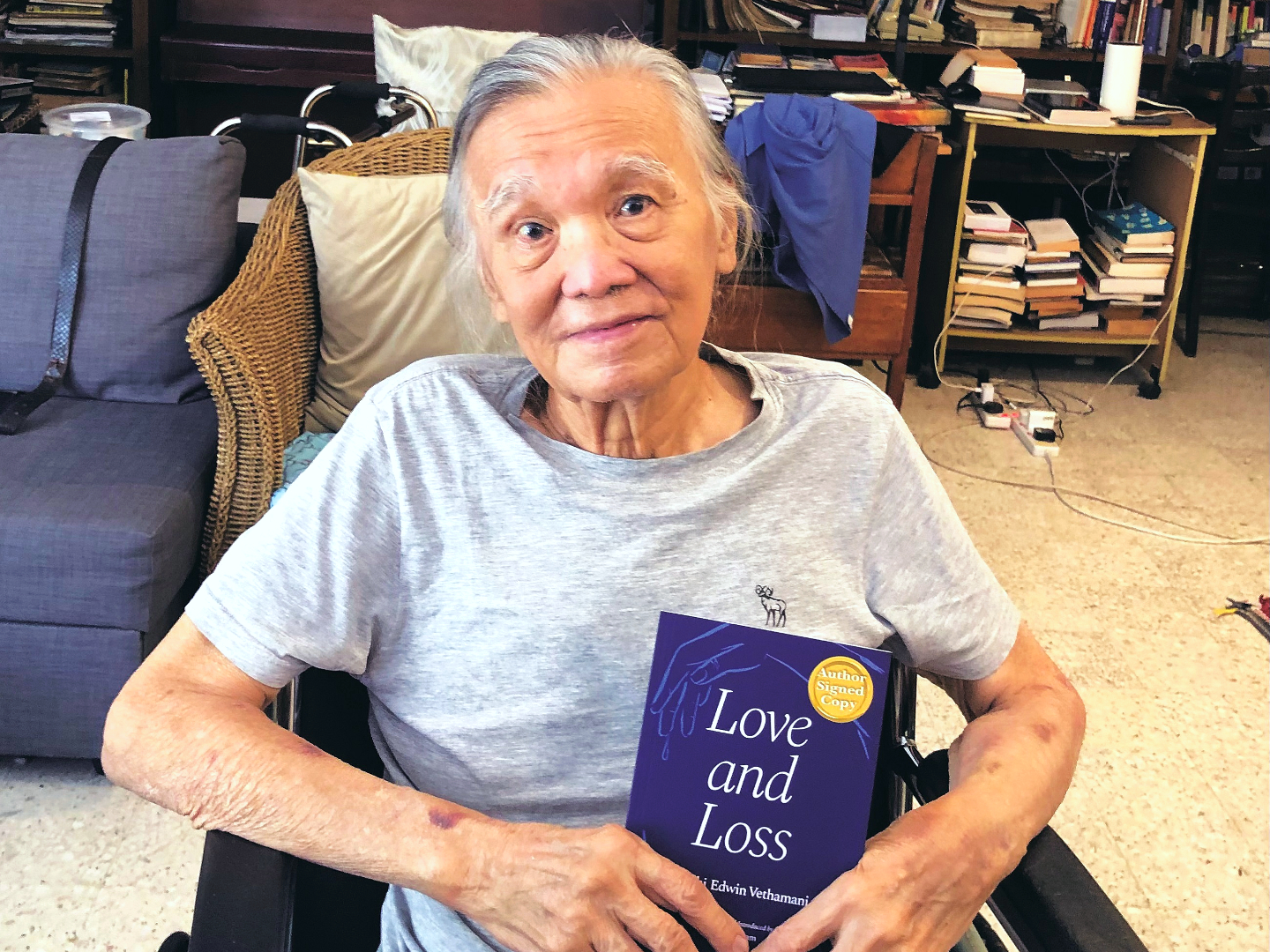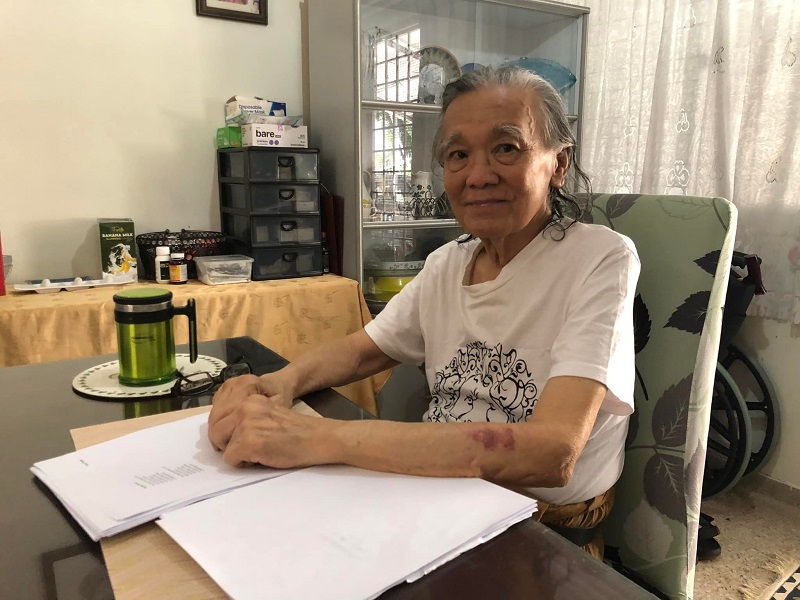
Wong selected and introduced Malachi Edwin Vethamani's poems in Love and Loss (Photo: Malachi Edwin Vethamani)
Kuala Lumpur-born Mohammed Razali Wong Phui Nam, who died on Sept 26, started writing while studying economics at University of Malaya in Singapore, inspired by Edwin Thumboo’s 1956 poetry collection, Rib of Earth. His early poems appeared in Bunga Emas, an anthology of Malayan writing released in the UK in 1964, and were published as a book, How the Hills are Distant, four years later.
After a two-decade hiatus, Wong came out with Remembering Grandma and Other Rumours in 1989, followed by Ways of Exile, Against the Wilderness, An Acre of Day’s Glass and The Hidden Papyrus of Hen-taui. He wrote four plays, the first of which, Anike, was published and performed in 2005.
Over the decades, he continued to take part in literary events, meeting young poets to whom he was generous with encouragement and advice, and working with those in literary circles to bring out new work. Here, some friends and fans pay tribute to Wong, one of the pioneers of Malaysian writing in English.
Datuk Mahadev Shankar, retired Court of Appeal judge
Wong Phui Nam’s passing marks the onset of a new era of the true Malaysian identity, which must show the world what it means to be a country free of bigotism and a shining example of racial harmony in a diverse group of ethnic races.
When we met at Victoria Institution, Kuala Lumpur, in 1947, he and I were both victims of wartime malnutrition. Although I was already 14 years old, I only weighed about 65 pounds. Phui Nam was even more diminutive. He could barely have been 40 pounds and his voice had not yet broken. However, by the time we left school in 1952, we had not only put on weight but also acquired intellectual capabilities that fully equipped us for the academic careers that followed.
He and his classmate, the late Harbhajan Singh Gill, refused to submit to the barbaric ragging that was the norm in university. From their very first day at the Dunearn Road Hostel in Singapore, they were brutally isolated by their “seniors”. Undeterred, they called their dormitory “Ye Airy Boers”, which became a beacon of defiance and their individuality. After graduating with a master’s degree in the arts, they returned to KL to pursue their chosen careers.
In the course of his working life, Phui Nam distinguished himself as one of Malaysia’s pioneers in the formation of the Malaysian cultural identity. A poet, dramatist and connoisseur of cultural music, he stood out as one of the country’s most illustrious sons. A full biography will be required to detail his many achievements. This must be left for the time being to others who are familiar with his body of work. For the nonce, let it be said here that his end is Malaysia’s beginning as a race with its own unique character.
Brandon Liew, writer and doctoral researcher
An important Malaysian poet has passed away, aged 87. Only a few weeks ago, Wong Phui Nam and I completed our recording of all his poems from How the Hills are Distant (1968) to The Hidden Papyrus of Hen-taui (2019). We spent many evenings together talking about death, poetry and supporting young poets. He was a passionate man and a voracious writer, an outspoken literary critic and a humble reader.
In the last month, I have had the privilege of showcasing his voice at an audio exhibition, A Wasteland of Malaysian Poetry in English, which I curated. I saw first-hand the eager joy of young poets listening to and discovering his work. So many asked me for his books and I was always disappointed that I had none left to give. For a brief moment in time, Wong Phui Nam was my friend and confidant, support and inspiration. To us, he was the image of a Malaysian poet and the under-appreciated vanguard of our time. How fortunate we are to have his legacy as our tradition.
Malachi Edwin Vethamani, writer, poet and emeritus professor
Wong Phui Nam received accolades and international recognition for his fine work throughout his long poetic life. In Malaysia, his writing was generally appreciated by academics and students of poetry, while lesser poets who wrote in the national language were given national awards. In recent years, Phui Nam was actively involved with young Malaysian writers. He was a judge for a national poetry competition in 2021 and one of the selectors of poems written by Malaysians below 35 years old. He took time to send advice to young poets, met them, and encouraged them to write. He was deeply concerned for Malaysian poetry in English and wanted to see it develop with new young voices with fresh ideas.
On a personal level, my friendship with Phui Nam grew over the last decade from my reading and, later, teaching of his poems. We worked on several projects. He selected and introduced my poems in Love and Loss, published in June. He loved poetry and was an immense influence. His health was poor in the last few years but he continued to attend book launches, meet young writers and nurture them. His demise signals the passing of one of the greatest Malayan poets who wrote in English and continued to be an important voice in Malaysian poetry in English. He will be remembered through his writing.
wong_phui_nam_1.jpg

Kee Thuan Chye, actor, dramatist, poet, journalist
I invited Phui Nam to write a column for New Straits Times when we started a literary page in the early 1990s because I had known him to be a poet. I didn’t know him well then; he had not been writing for a while. I think in the 1970s, owing to the rise of Malay neo-nationalism, there was this big dilemma faced by Malaysian English-language writers about whether they should continue to write in the language of our former colonisers. There was a lot of guilt-tripping by nationalist Malays. Gapena came out with the dictum that only literature written in Malay could be considered national literature.
Phui Nam was caught up in that. He tried to switch to writing in Malay but wasn’t successful. So when I approached him to write the column, Other Cadences, he was quite pleased to get back to writing. And in English. He was very earnest about the points he made in his articles, such that whenever anyone wrote in to challenge his thoughts, he would invariably post a reply. Sometimes, it led to a series of exchanges between him and his critic. He would never let up, even though I sometimes advised him to.
Philip Koh, adjunct professor, Universiti Malaya
I read Sophocles’ Antigone (translated by Dudley Fitts and Robert Fitzgerald) with two batches of law students at Universiti Malaya under its law and literature elective and also introduced Wong Phui Nam’s play, Anike, to them. Its plot mirrors that of Antigone and his
contextualisation is worthy to be read. As a theatre production, it was effective as testimony of a courageous, feminine figure contesting patriarchal power in an Asian context.
Fadzilah Amin, retired lecturer in English literature
With Phui Nam’s death, I feel Malaysia has lost one of our best poets, maybe our best poet. It is a shame that he was not given wider recognition because he wrote in English. When I read his poems, I feel here is a poet who expresses eloquently what lies in the depth of his heart.
Sharon Bakar, English-language teacher, freelance writer and editor
Phui Nam came to our readings over the years; it was special that he did. I judged one poetry competition with him, organised by Nottingham University. We had a discussion on what makes a good poem, and we all agreed on the winner. It was a real pleasure working with him and having that dialogue on poetry. He was supportive of other poets and generous with advice. He was such a nice man: You always feel it when you lose someone from your community. People had deep respect for him and his name would be mentioned when they talked about Malaysian poets.
Leonard Jeyam, lecturer, writer and literary critic
I have known Phui Nam both as a friend and his literary editor since 2008. I actually wrote half my doctoral thesis on his verse and upon my returning home from Kent, we became friends. He was probably the last of the ‘major’ voices of Malaysian literature in English, well before Edward Said made postcolonial approaches to understanding culture and society fashionable. Phui Nam fashioned his main themes around his rather brave indictment of Malaya (later Malaysia), in that what the British left behind was a cultural wasteland which, in truth, would not be able to sustain itself politically, culturally and even imaginatively. Imagine that: His poetry foresaw the sterility of the nation we see today.
His later volumes continued these concerns but also added a new one: that the way out of this wasteland was to employ a religious matrix of the understanding of life, of all the major religions of the world. Though his moments of redemption and transcendence were rare, they, when enacted meaningfully, were eloquent and powerful.
A Samad Said, National Laureate
He made everyone feel truly Malaysian.
This article first appeared on Oct 3, 2022 in The Edge Malaysia.


